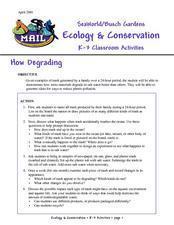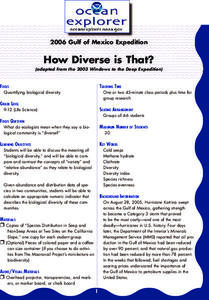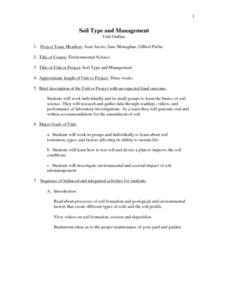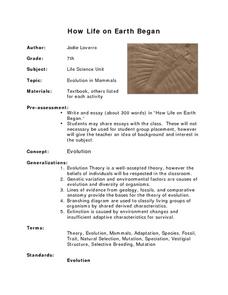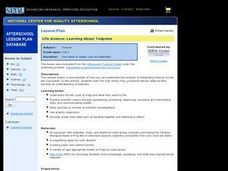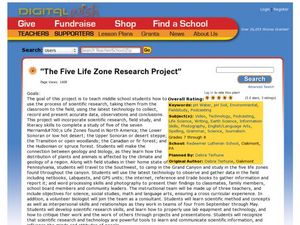British Council
Plastic-Free Is Not Easy
Paper or plastic? Scholars discuss a worksheet containing grocery photos in which consumers were challenged to buy items without plastic wrapping or containers. Learners rank the food items by the need for packaging, such as a banana,...
Curated OER
Earth's Heavenly Treasures: Hummingbirds
Young ornithologists watch an informative video and use the Internet to gather data about the life, size, habitat, and migration of hummingbirds. The interdisciplinary lesson includes activities that target art, science, math, and...
Curated OER
The Marvels of Mud
Young scientists roll up their sleeves and get a little dirty in this three-day earth science investigation. Following the scientific method, children monitor the growth of algae in pond water samples in order to determine...
SeaWorld
Ecology & Conservation
How much trash does an average family produce in 24 hours? Where does that trash end up? Get your youngsters thinking about ecology and conservation as they discuss the impact pollution has on the marine environment. After a deep...
Carnegie Mellon University
Consumer Preferences in Lighting
What is a watt? This tongue-twisting, mind-bending question and others are answered through this lesson on the different lighting options available. With the support of a PowerPoint, teach your physical science class about units of...
American Museum of Natural History
Ocean Creature Feature
From coloring to hard protective shells, ocean creatures have adaptation features that help them survive. An eight-question online quiz highlights different ocean animals and their unique characteristics. The resource then offers pop-up...
Purdue University
Yucky Water? No Problem!
Young scholars study the process of water filtration in a three-part STEM instructional activity. After analyzing samples of dirty water, teams design and build their own filtration systems and measure their efficiency.
Curated OER
Conservation in Small Spaces: Butterfly Life cycles
Students discuss ways that butterflies and moths change during their lifecycles, observe caterpillars, and explore how their different body parts work.
Pulitzer Center
Exploring Downstream: Water Resources
The lack of clean water is a life-threatening plight for millions of people around the world. Through an extensive WebQuest, young environment or social studies classes compare our water availability to that of the cxitizens of Ethiopia,...
Curated OER
How Diverse is That?
After reviewing biodiversity, learners work in small groups to analyze actual species distribution data. They learn to calculate the Shannon-Weaver diversity index for different communities. Though not particularly engaging, the content...
Curated OER
Materials, Let's Do the Life Cycle
Students examine environmental and social impacts of products that consumers buy. In this environmental stewardship lesson plan, students play a game that requires them to consider real costs of products. Students consider the...
Curated OER
Science and Careers
Students investigate how knowledge of science influences people in their daily lives, specifically in their careers. Students conduct interviews with an individual in a science or technology career as part of their research on the impact...
Curated OER
Environmental Science/Water Pollution
Students study natural habitats, aquatic life, renewable and non-renewable resources. They discuss conservation efforts for sea otters and desert toad in this units.
Curated OER
Soil Type and Management
Students study the basics of soil science. They research and gather data through readings, videos, and performance of laboratory investigations. As a team they generate oral and written recommendations for the amendment of soil.
California Academy of Science
Color Vision Genetics Evolution Simulation
At one point, all mammals carried only two color receptors, but now most humans carry three. An informative presentation and hands-on activity demonstrate how this evolved through genetics. By participating in the activity, pupils...
Curated OER
Marine Environmental Geology
Students take this course as an introduction to the aspects of marine geology and oceanography that affect the environment and marine resources. Topics include estuarine oceanography and sediments, eutrophication of coastal waters,...
Curated OER
Is Environmental Health a Basic Human Right?
Students examine basic human rights as defined by the United Nations. They develop a list of rights by class consensus, read an article, answer discussion questions, and complete a worksheet.
Curated OER
Environmental Health Hazards and Children
Learners are introduced to the environmental hazards their community is facing. In groups, they develop a list of the ways humans have changed the Earth and how these changes have lead to environmental hazards. They record their...
Curated OER
How Life on Earth Began
Seventh graders investigate the concept of evolution and how it was a mechanism for the foundation of life on Earth. They conduct research and attempt to make cognitive connections with the evidence to agree with the presupposition of...
Curated OER
A Bug's Life: Diary of an Insect's Metamorphosis
Fifth graders examine the stages of insect's to understand heredity. In this inherited traits lesson, 5th graders explore the life of the honeybee for its inherited traits. Students recognize the difference between inherited traits...
Curated OER
Life Science- Learning About Tadpoles
Learners investigate a frog's life cycle. In this tadpole lesson, students observe tadpoles in an aquarium and record results. Learners fill in a KWL chart as an assessment.
Curated OER
The Five Life Zone Research Project
Students study five of the seven life zones in North America. In this journalism lesson students use the Scientific Method working in teams. They use lab equipment and technology to create a presentation on five of the seven life zones...
Curated OER
Importance of Marine Protected Areas: an Overfishing Simulation
Students simulate overfishing by conducting a guided experiment in the classroom. In this ecology lesson, students discuss the environmental consequences of overfishing. They research additional information about the issue and share...
Teach Engineering
Sugar Spill!
Sugar isn't good for you, but it's great for yeast! Scholars design an experiment to investigate how variables affect the rate of sugar consumption in yeast. The last installment of a nine-part Life Science unit considers how scientists...





